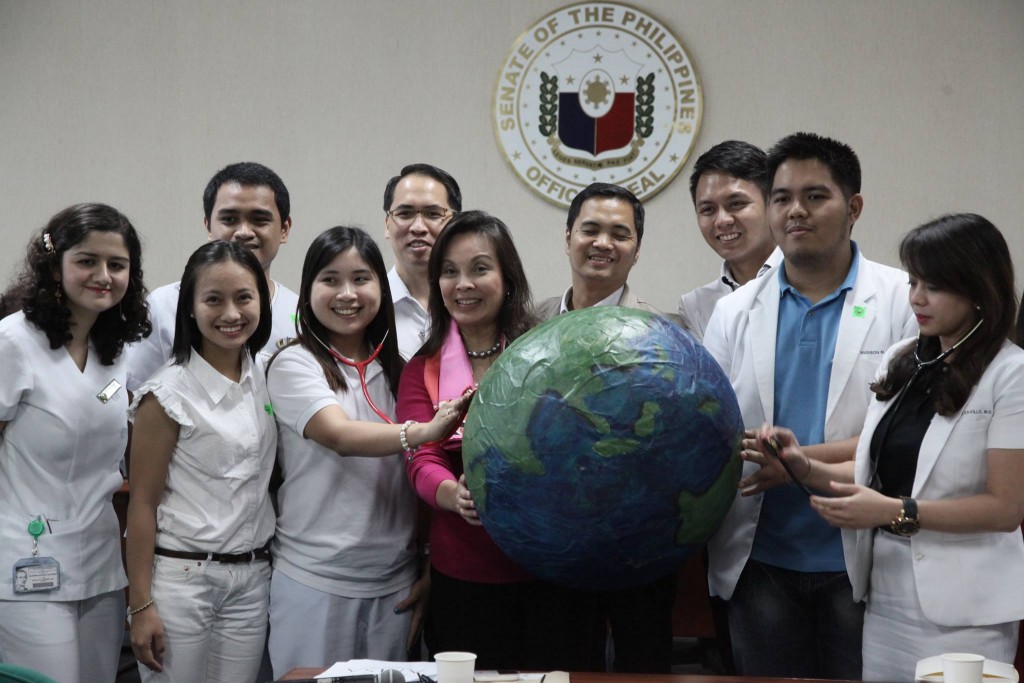
Photo Courtesy Office of Senator Loren Legarda
Manila, Philippines — Few days after the 2nd anniversary of Typhoon Haiyan and 20 days before the UN Climate Change Conference in Paris this December, health sector leaders from the Philippines called for stronger commitments for climate mitigation by phasing out coal and other fossil fuels and shifting to renewable energy to protect both human health and the global climate.
Health Care Without Harm (HCWH)-Asia, together with different health sector organizations and leaders in the Philippines, launched the Paris Platform for Healthy Energy during a forum entitled “The Necessary Alternatives: Balancing Energy, Health and the Climate Challenge” held at the Senate of the Philippines.
Dr. Renzo Guinto, campaigner for the HCWH-Asia’s Healthy Energy Initiative in the Philippines, explains the importance of the Platform: “Through the Paris Platform for Healthy Energy, the health sector is making it very clear that urgent global action is needed to limit greenhouse gas emissions. This would not only reduce health risks from climate change but also yield large health benefits and cost savings from prevented illness and premature death resulting from air pollution.”
The Platform calls on governments and international institutions to, among others: cease the deadly and costly dependence on fossil fuels; reach an international agreement that fosters the transition to clean, renewable energy; require health impact assessments as requirements for new energy projects; and include considerations for health impacts, as well as health costs and benefits, in energy policies and projects.
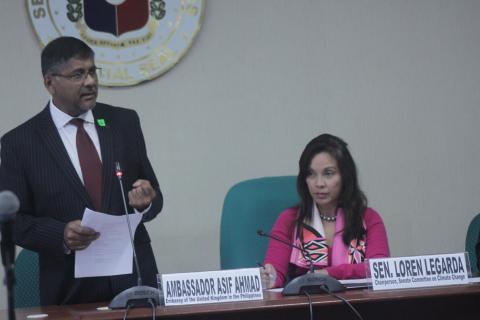
British Embassy Manila Ambassador Asif Ahmad and Sen. Loren Legarda
Senator Loren Legarda, chair of the Senate Committee on Climate Change and convenor of the forum also expressed her support for The Platform. “Clean energy is not a future concept; it is the necessary alternative if we want to live a healthy life in a world that is not decimated because of climate change, but a world for the next generations to flourish in.”
Health impacts of climate change in the Philippines
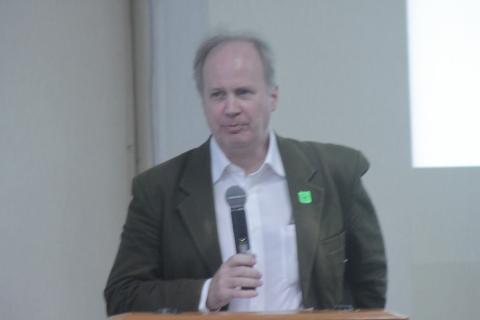
London School of Hygiene and Tropical Medicine Professor Paul Wilkinson explains the connections between health and energy choices during the Senate forum
The Philippines is one of the countries in the world most vulnerable to the impacts of climate change, yet the country is expecting aggressive growth of coal in its energy mix.
As of May 2015, the Philippines has 17 operating coal plants (30 units), and 29 more (59 units) have already been approved for construction until 2020. Last October, the Philippines submitted its Intended Nationally Determined Contribution (INDC) to the United Nations Framework Convention on Climate Change, pegging an ambitious 70% reduction target in greenhouse gas emissions, including from the energy sector.
Mobilizing the health sector
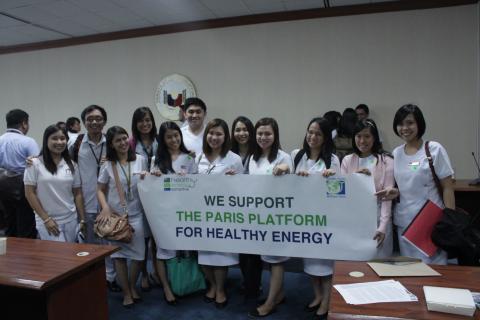
“As physicians, it is imperative that we support the use of renewable energy sources,” said Dr. Maria Minerva Calimag, President of the Philippine Medical Association. “The disease burden caused by fossil fuel emissions includes many cardio-respiratory diseases that result in deaths worldwide.”
“Fuel-based energy sources cause more harm than good,” added Congresswoman Leah Paquiz of Ang NARS Party-List. “My hope is clean, healthy and sustainable energy for us and for future generations, and as an ambassador of health workers in the Congress, I express my strong support for the Paris Platform.”
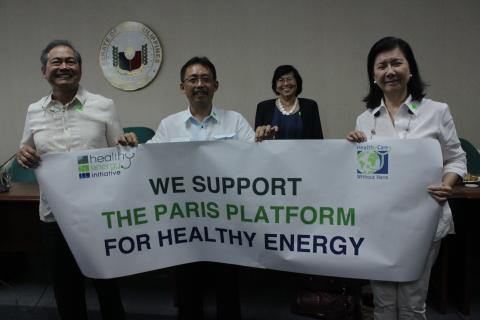
John Aaron Mendoza, president of the Asian Medical Students’ Association-Philippines, believes that the Paris Platform lays out a more secure future for both health and climate. “As future doctors and health professionals, we will be witnessing the health effects of climate change in our clinics and communities – but prevention is always better than cure and that is why we cannot wait for that scenario. Healthy renewable energy is the way forward for health and climate,” said Mendoza.
Other health sector organizations in the Philippines that endorsed the Platform include: National League of Philippine Government Nurses, Inc.; Philippine Association of Medical Technologists; One for Nursing Empowerment; and Young Pharmacists Group-Philippines.
An appeal to the Department of Health
During the forum, a petition signed by various health sector leaders, along with a copy of the Paris Platform, was also handed to Department of Health (DOH) Secretary Janette Garin through Undersecretary Vicente Belizario Jr. The petition called on the DOH to “make a clear statement calling for the phase out of coal and transition to renewable energy in the Philippines coming from a public health perspective” and “institutionalize the conduct of health impact assessments as part of the process for the approval of future energy projects,” among others.
The Platform is in part a response to a special report issued earlier this year by the internationally renowned medical journal The Lancet, which stated that “tackling climate change could be the greatest global health opportunity of the 21st century.” The Lancet specifically called on governments to rapidly phase out coal from the global energy mix to protect cardiovascular and respiratory health, and to rapidly expand access to renewable energy in low- and middle-income countries.
The lead endorsers of the Platform are Health Care Without Harm, the World Federation of Public Health Associations, the Climate and Health Alliance, and the Health and Environment Alliance.
The Platform can be accessed here: https://healthyenergyinitiative.org/platform



